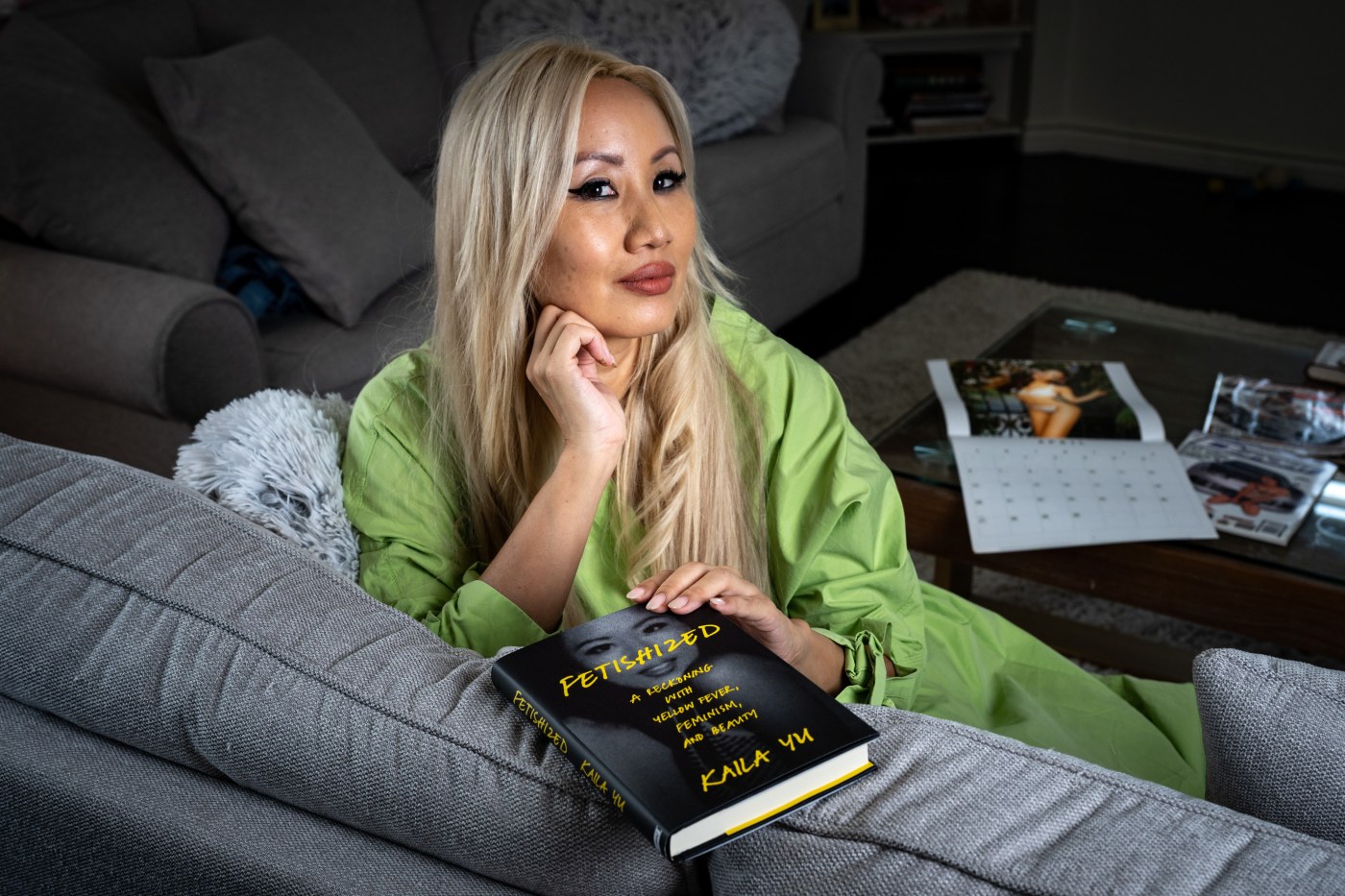
As a young Taiwanese girl living in the Inland Empire, former singer and import model-turned-writer Kaila Yu said she often felt “uncomfortable” in her skin, growing up around Eurocentric beauty standards.
“I felt like my features weren’t desirable,” Yu said of her childhood. “I felt very insecure about all of that.”
The now 46-year-old L.A.-based author explores themes of sexuality and race in her debut memoir, “Fetishized: A Reckoning with Yellow Fever, Feminism, and Beauty,” — out everywhere books are sold.
The candid memoir-in-essays format explores Yu’s upbringing in the 1990s and early 2000s, blending “vulnerable stories from her life with incisive cultural critique and history,” according to the synopsis. “Fetishized” explores Yu’s complex, intimate feelings around representation and objectifying stereotypes, while looking at how the media and colonialism have played a part in the “oversexualization of Asian women.”
“Growing up, Asians were so invisible, objectification was better than nothing,” Yu writes in the book, which the New York Times called “raw and lyrical.”
Born to Taiwanese immigrant parents, Yu grew up in Upland, attended Upland High School, and later earned a bachelor’s degree in Asian American studies from UCLA.
Related Articles
How Michael Koresky explores Hollywood’s gay golden age in ‘Sick and Dirty’
Why Jeff Weiss melds fiction and nonfiction in ‘Waiting for Britney Spears’
Why UC Berkeley professor Robert Reich is optimistic young people can be the ‘heroes of tomorrow’
No more shushing: Bay Area libraries have a new strategy for attracting visitors — and it’s working
Gillian Anderson appears to be mystery lover in famed restaurateur’s book
With the rise in anti-Asian hate amid the COVID-19 pandemic, and the March 2021 spa shootings in Atlanta that killed eight people, including six Asian women, Yu said she was inspired to begin writing her book. What happened at the spa stood out to her as a prime example of how the “fetishization of Asian women leads to real-life violence on Asian women,” she said.
Yu’s new book unpacks her career working as a former import car model and lead singer of the pop rock band Nylon Pink until 2015. She opens up about wearing scantily clad outfits, writing hypersexual lyrics that were “more performance,” she said, than reflective of her true self.
Following a “desire to be seen as beautiful,” Yu felt she played into stereotypes associated with Asian women through different moments in her career — hoping to prove to both herself and others that she’s “worthy of love.” The author said she grappled with impossible beauty standards which led her to alter her body through different procedures — including a double eyelid surgery and plastic surgery — after years of feeling “othered.”
Throughout her memoir, Yu reflects on the trauma of losing her sense of self “in pursuit of the image she thought the world wanted… reckoning with being an object of Asian fetish,” she writes. Battling a drug addiction, feeling misrepresented and “dehumanized” in the acting/modeling industry, and seeking to be desirable to “the White male gaze,” she said she often felt empty.
Yu’s book explores issues of racism and fetishization, unpacking the harmful impact of “yellow fever” — a problematic term describing a typically sexual Asian fetish — which scholar Robin Zheng defines as a primary “preference for Asian women (and men).”
The name, which derives from the mosquito-borne disease, emphasizes the phrase’s derogatory nature, Yu said. It has roots in outdated “orientalist” beliefs that Asian women are also “somehow more docile,” while also seen as “exotic, highly sexual beings.”
“Like mosquitoes, fetishists suck the humanity out of Asian women, turning them into 2D sex objects,” Yu writes.
“Fetishized” also explores problematic Asian female representation in media, which Yu said includes “hypersexualized” models or actress portrayals. She cites examples like pin-up model Sung-Hi Lee, the book-turned-film “Memoirs of a Geisha,” or different music videos or films portraying violence or sex. Providing an honest critique, Yu’s memoir looks at moments in culture that, she said, “reduced (Asian women) to bodies and menu items… as subservient props.”
She said all of this reinforced harmful stereotypes about Asian women and sexuality, which many — herself included — felt they needed to follow in their appearances and careers.
Asian women are often “not celebrated for our strength, humanity, and intelligence,” Yu writes in the book. Because of fetishization, they are instead “reduced to a fantasy fitting a male-dominance narrative.”
Now, Yu finds hope that diverse Asian representation in media has grown tremendously — and with more positive portrayals — from before.
But with Asian lead roles still significantly underrepresented, Yu said more work needs to be done.
As an author, luxury travel and culture journalist, Yu has since written about other harms toward Asian communities, among other things. Her writing on entertainment, travel and lifestyle has been featured in the Los Angeles Times, National Geographic and Rolling Stone.
Yu hopes that “Fetishized” adds to the complex, nuanced conversations about her community.
Yu’s debut memoir, “Fetishized: A Reckoning with Yellow Fever, Feminism, and Beauty,” can be found everywhere books are sold. More information and future events are shared on her social media, @kailayu.
Staff writer Allyson Vergara contributed to this report.